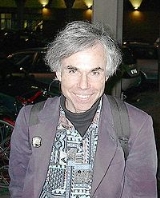
academic
whose research focuses on consciousness, analogy-making, artistic creation, literary translation, and discovery in mathematics and physics. He is best known for his book Gödel, Escher, Bach: an Eternal Golden Braid
, first published in 1979, for which he was awarded the 1980 Pulitzer Prize
for general non-fiction.
Hofstadter was born in New York, New York, the son of Nobel Prize
-winning physicist Robert Hofstadter
.
Which statement seems more true: (1) I have a brain. (2) I am a brain.![]()
In fact, a sense of essence is, in essence, the essence of sense, in effect.![]()
The "Strange Loop" phenomenon occurs whenever, by moving upwards (or downwards) through levels of some hierarchial system, we unexpectedly find ourselves right back where we started.![]()
The proverbial German phenomenon of the verb-at-the-end about which droll tales of absentminded professors who would begin a sentence, ramble on for an entire lecture, and then finish up by rattling off a string of verbs by which their audience, for whom the stack had long since lost its coherence, would be totally nonplussed, are told, is an excellent example of linguistic recursion.![]()
Hofstadter's Law: It always takes longer than you expect, even when you take into account Hofstadter's Law.![]()
Perhaps the most concise summary of enlightenment would be: transcending dualism. … Dualism is the conceptual division of the world into categories. … human perception is by nature a dualistic phenomenon— which makes the quest for enlightenment an uphill struggle, to say the least.![]()
Relying on words to lead you to the truth is like relying on an incomplete formal system to lead you to the truth. A formal system will give you some truths, but as we shall soon see, a formal system, no matter how powerful—cannot lead to all truths. ![]()
Below Every Tangled Hierarchy Lies An Inviolate Level![]()

